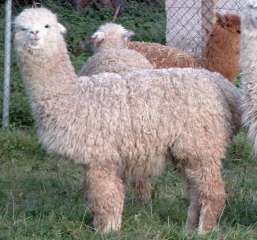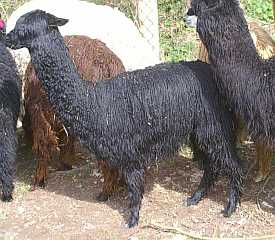

The
home of the alpacas: Chile, Peru and Bolivia in South America. A landscape
those the sea, grassland and mountains in special beauty interconnects. Here
the alpacas were domesticate by the Incas, and bred from Vicuña and
Guanaco before approx. 5000 years
Alpacas belong to the new world camelids such as lamas, vicuñas and
guanacos. In the whole world there are about 3 million alpacas. Of it ever
approx. 30000 in Australia and North America, 6000 in England and 2000 in Germany.
They can get about 20 to 25 years old and the stick measure is approx. 80 to
100 cm. Their body weight is attained full growth with 60 to 75 kg and the
wool production for each to alpaca lies at present with approximately 3 to
6 kg in the year. Alpacas are in Germany as agricultural utilizable animals
recognized since 1996. It is not necessary to have a special proof to be owner
or for breeding them in Germany.
Grace in the summer and hay in the winter is the main source of food for alpacas.
By the hard conditions in their homeland they are better excellent fodder-worth,
than other utilizable animals.
The Alpaca wool is worldwide very desired by the textile industry. The fibre
ranks beside Kashmir and silk among the noblest natural fibres. Softness, refinement
and an indescribable gloss made it so desired. Today we find more than 22 natural
colours of the alpaca fibre. The colour plate reaches from a deep black, brown,
grey or rose grey up to pure white. The positive trend on the part of the textile
industry and the consumer, natural and uncoloured wool too received, continued
to advance the breed of collared animals over the last years
Babies are called crias, the females hembras and the males machos. And in such
a way behave it self macho - the males also now and then. These terms are coming
original from the Spanish language.
Alpacas are very tough and durable. In the southern part of South America they
are suspended extreme climatic conditions. So they are to be adjusted it used
still on the same day high plus and also for temperatures below freezing. Our
moderate climate makes thereby no demands and the here living Alpacas.
Care of Alpacas is not a particularly difficult chapter. By there small visible
size they are to be kept very simple under control. Special care expenditure
is not necessary, but annual shearing, worming, inoculating and the regular
cut the foot nails already belong to the tasks. Also good control of the teeth
and the entire appearance is advisable. Alpacas are not susceptible at all
to diseases.
Crias, babies are born annually. A female carries about 11.5 months and gets
usually in each case a cria. Newborn children weigh approx. 8 kg. The raising
rate in our widths is with approx. 90%. In the countries of origin of South
America only around 33%. Short time after the birth is running the newborn
cria and nurse by the mother. The birth takes place at daylight, mostly in
the morning in the protection of the herd, so that the cria is warmed and dried
by the sun. After approximately 2-3 weeks is again ready to breed to take up
and lets so the male again grant, what is possible the whole year over.
There are two kinds of alpacas, the huacaya and the suri; where by only about
4% of the world population are suris. With the huacaya the skin has one crimps
similarly the merino sheep. Suris against it have smooth skin of which in curls
down hang.


Alpacas are friendly and good-natured natures. They do not spit after humans.
They are intelligently, curious and affectionate. These gentle characteristics
and their reassuring kind, love also children very the joy fast special at
handling alpacas find. Alpacas are herd animals; therefore one should hold
at least 2 animals.
Alpacas are very watchful, too. They oppose aggressors, as hunting dogs or
foxes, effectively. Without shyness they lower their head and do not signal
defence-understand, it can get already times a violent kick set. For this reason
alpacas go along also in other countries as watchers, for example from herds
of sheep on journey.
Alpacas converse also with one another. By different body attitudes and a multiplicity
of different sounds. But their gentle, nearly already graceful humming makes
it so indescribably love worth.
Pastures live are for alpacas in and everything. So they can normally be the
whole year over outside. They love it then an airy shelter to visit to be able.
One bathing place with fine sand, for the wool and skin cleaning becomes several
times on the day the popular playing field of the herd. The fence are enough
one 1.50 m of high. This fence is more to protect them self.
Alpacas are walking like camels. Compared with cows, horses or sheep they do
not damage the soil on that them move. Since they do not pluck additionally
with food intake, but the points purposefully graze, are them excellent landscape
or dyke male nurse. The grass scar is not hurt and sensitive dams are not damaged.
Alpacas
are an extraordinary part of nature and as production for the harmonious keeping
of domestic cattle.
It is a completely special harmony from these animals goes out.
You are interested more intensively in alpacas? A very good decision you will
not surely repent!
You also like to come in this enjoyment? We are glad to help to select the
correct animals; those are fit to your needs. Fair, honestly and well advice.
For example as: wool producer on highest quality level, pasture animals as partners of e.g. horses, sheep guards for the security of its herd, landscape and dyke male nurse, or as gentle of domestic animals for enriching the family life.
At our Farm you can select out from over 60 animals the fitting alpacas for you.
We co-operate with the most known alpaca breeders and we can arrange animals for you also directly from South America.
If you are like to breed, and that with interesting future prospects, please contact us directly on purposeful support. We can facilitate the entrance for you.
Visitors are at any time welcome after telephone advance notification.
Susanne Neitzke, Zum alten Sägewerk 1, 99706 Sondershausen, North Thuringia, in the middle of Germany.
Phone: 0049 3632 543214
Mail: suri@gmx.net Home to www.surifarm.de